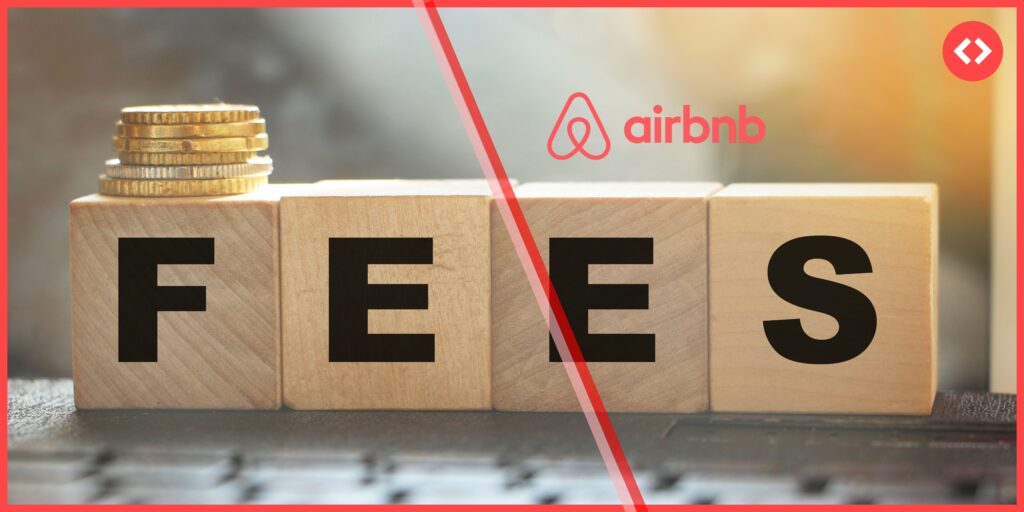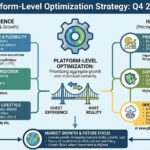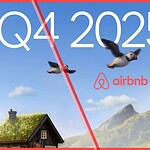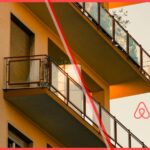Airbnb is switching all PMS-connected listings to a host-only fee model globally , and understandably, there’s been a lot of confusion around what this means.
That’s why we hosted a free webinar: not to cause alarm, but to bring clarity. In partnership with RevLabs by PriceLabs, we gathered industry experts who’ve already navigated this shift, crunching the numbers, and are actively helping property managers adapt with confidence.
- Theoharis Mihailidis, Founder of VillaRentals.gr and General Secretary of STAMA Greece, manages 160+ listings in a country where host-only has long been the default, and is now dealing with the new commission hike.
- John An, Founder of TechTape and President of Ohana Stay, helps operators model revenue impact and calculate what changes they need to maintain profit.
- Monique DeLorenzo Pomeroy, PriceLabs, brings hands-on insight into how to adjust PMS settings and pricing logic to avoid undercharging.
- Thibault Masson, Founder of RSU by PriceLabs and webinar host, connected the dots on why Airbnb is doing this, what it means across different regions, and what actions to take.
Here are the top takeaways from the session, and how to stay ahead of the change.
1. What Airbnb Announced and When It Takes Effect?
Previously, many Airbnb listings operated under a split-fee model. Now, Airbnb is rolling out a global shift to a host-only fee model, applicable to PMS-connected listings. This means the entire service fee will now be deducted from the host’s payout, which can significantly affect profit margins if adjustments are not made by managers.
In Europe, where host-only has already been the standard for years, Airbnb is increasing the commission from 15% to 15.5%. And in Brazil, at 16%.
Important to note: The service fee is calculated on the nightly rate, cleaning fee, and any additional charges, but does not apply to taxes. This means your final payout may be lower than expected if your pricing isn’t adjusted accordingly.
This isn’t a sudden overnight switch, but it’s rolling out quickly:
- August 25, 2025 – All new PMS-connected hosts were immediately placed on the host-only model.
- October 27, 2025 – The majority of PMS-connected listings will be auto-migrated to the 15.5% host-only fee.
- December 1, 2025 – Even non-PMS hosts already using host-only will see their fee raised from 15% to 15.5%.
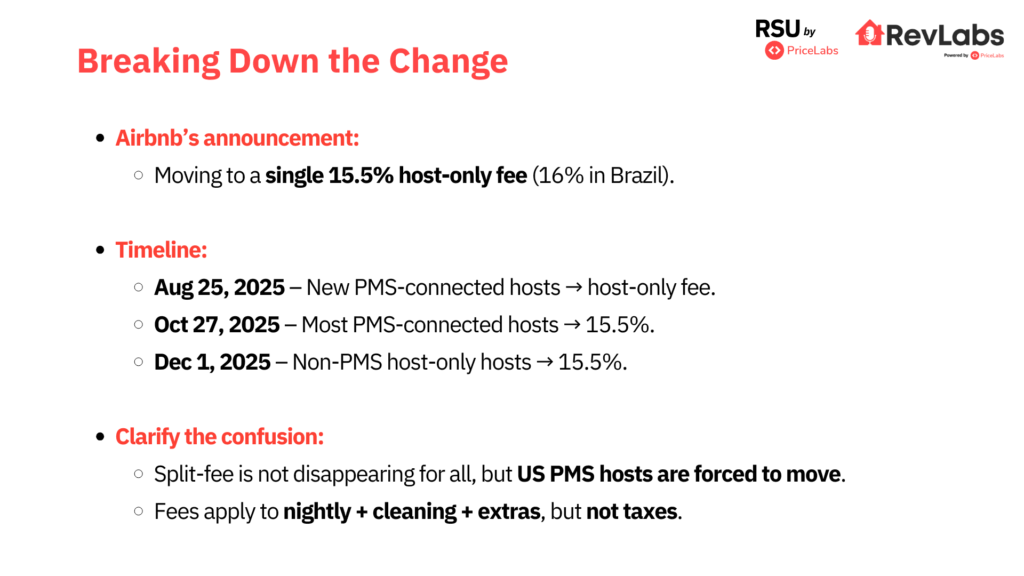
What Property Managers Can Do:
- If you’re on a split-fee setup: You’ll need to adjust your markup strategy. This doesn’t mean guests will see much of a price hike; Airbnb is just shifting the service fee from the guest side to the host side. To the guest, the total price looks nearly the same..
- If you’re already on host-only: Check your PMS or channel manager to ensure your markup accommodates the new 15.5% rate.
How to Adjust Correct Markup to Offset Airbnb’s Host-Only Fee (U.S. and Europe Example)
With Airbnb moving to a host-only fee model, property managers must rethink how they calculate their prices, markups, especially if they want to keep payouts consistent without absorbing the new fee.
How the Markup Works for U.S. PMS Hosts
To maintain the same net payout under Airbnb’s new host-only fee model, property managers must apply a markup factor of 1.1834 or +18.34% across both nightly rates and extras (like cleaning).
Let’s break this down:
- Nightly rate: A $100 base price becomes $118.34 after markup.
- Cleaning fee: If you used to charge $100, it also becomes $118.34 with the same markup.
This gives a subtotal of $236.68. Airbnb now applies the 15.5% host-only fee on this full amount (not just the nightly rate), which equals $36.68.
So, the host nets exactly $200, which is what they would’ve received under the old split-fee model. Meanwhile, the guest pays $236.68 total, same as before, just without seeing a separate Airbnb fee line.
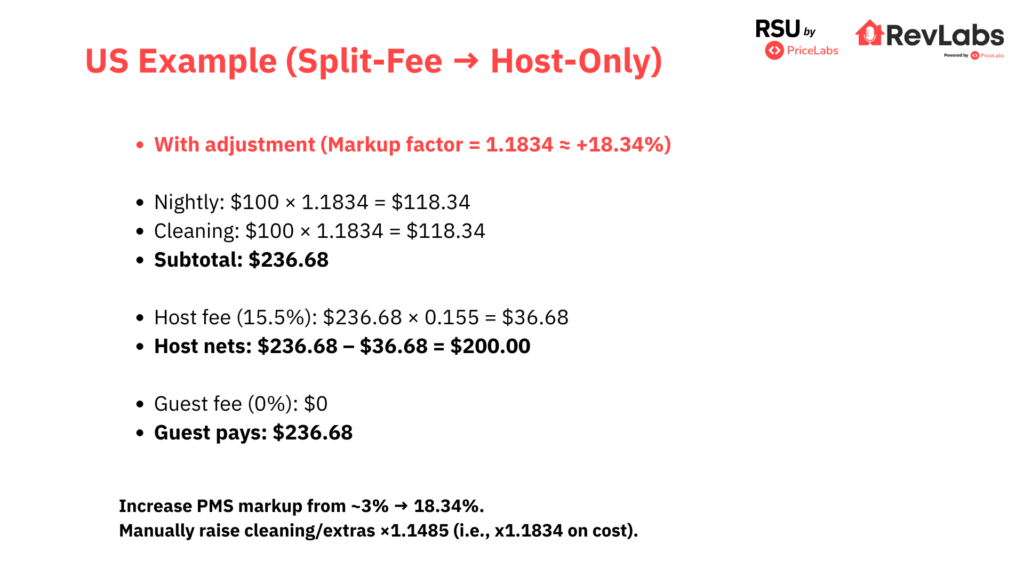
How the Markup Works for Europe
For hosts in Europe and other non-U.S. regions, Airbnb is raising the host-only commission from 15% to 15.5%. While that may sound minor, panelist Theoharis Mihailidis explained how even a small increase can have a meaningful financial impact, especially for luxury listings where total charges are high and margins are carefully managed.
Let’s walk through the example:
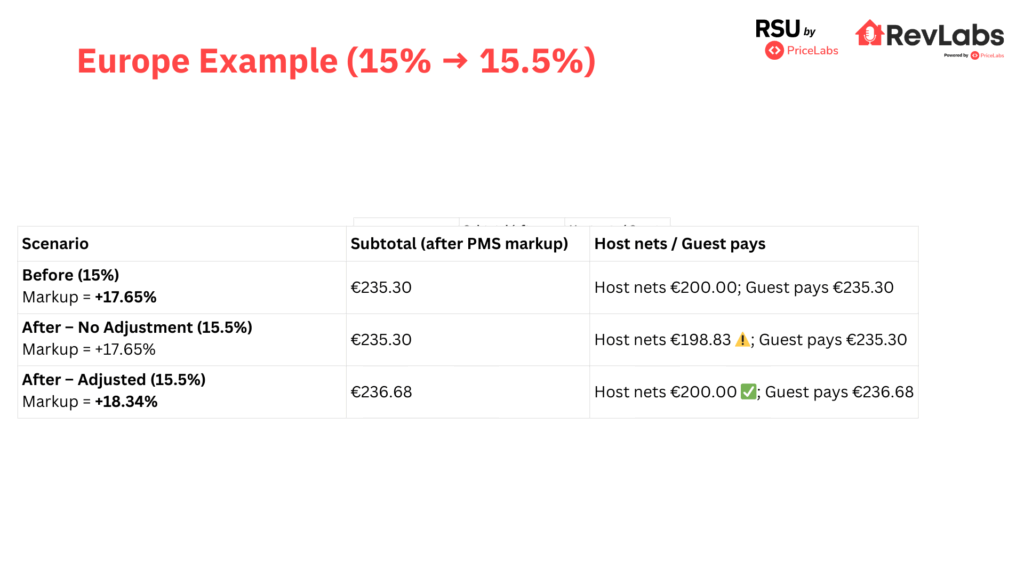
What Property Managers Should Do
- Apply the markup not just to nightly rates, but also cleaning fees and any extra charges (Airbnb takes fees on those too).
- Validate changes by comparing your payouts before and after, and make sure what guests pay covers your target margin.
Update Your PMS and Communicate with Owners Now
Once you’ve applied the correct markup, the next step is operational: make sure your PMS and owners are aligned.
Many property management systems don’t automatically adjust pricing to reflect the host-only fee model. If you don’t take action, your listings may undercharge guests, cutting directly into your margins. Worse, this could go unnoticed until payouts drop.
“If you don’t show owners the before and after impact with clear numbers, they’ll think you’re just inflating prices,” Monique explained.
Thibault Masson pointed out that educating owners and internal teams is just as important as getting the math right. Managers must explain that Airbnb isn’t “raising fees”; they’re simply shifting the entire cost to hosts. That requires a pricing change to keep payouts stable.
What Property Managers Should Do:
- Update your PMS settings to reflect the new host-only fee. Many systems require a manual adjustment to markups or commission logic. Don’t assume it’s automatic.
- Create an owner communication plan. Explain: What Airbnb changed
How it affects payouts, why nightly prices must rise to preserve earnings, and what you’re doing to manage it.
Clarity Is Your Competitive Advantage
One of the biggest takeaways from the webinar was just how much confusion still surrounds this update, and how that confusion can hurt property managers if not addressed head-on.
As Thibault pointed out, the core misunderstanding lies in thinking that a 15.5% Airbnb fee simply requires a 15.5% markup. In reality, the math doesn’t work that way.
- Under the old split-fee model, Airbnb’s 3% host fee translated to only about a 3.09% markup, which most PMS systems easily absorbed without much thought.
- But under the new host-only 15.5% model, a simple 15.5% markup isn’t enough to cover the cost; you actually need to raise prices by 18.34% to break even.
This mismatch between fee percentage and markup percentage is the root cause of why many hosts and property managers are seeing lower-than-expected payouts, and why some may feel blindsided.
“Airbnb’s communication didn’t explain the difference between the fee and the markup,” Thibault noted. “That’s why a lot of hosts feel lost.”
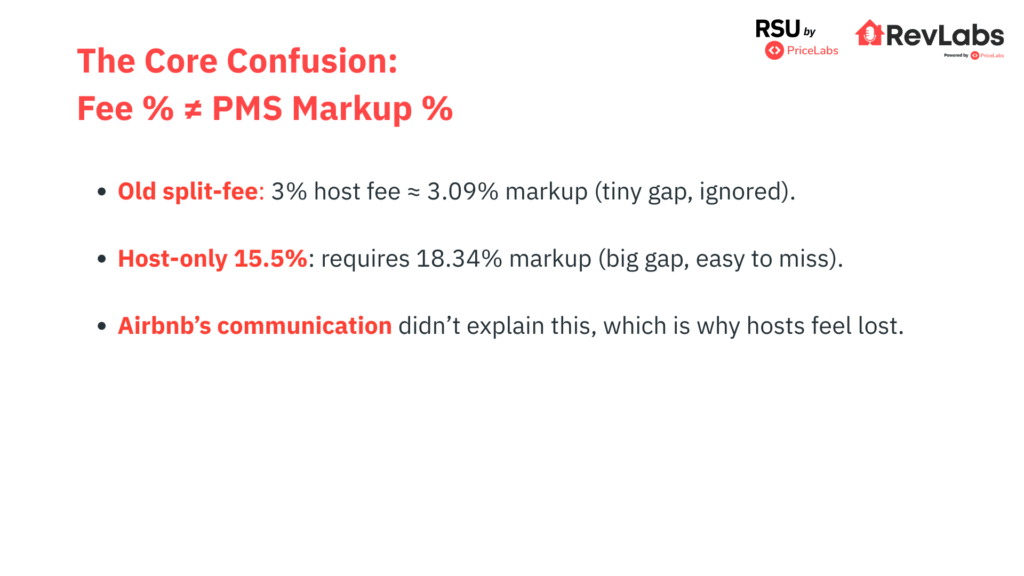
What Property Managers Can Do:
- Educate yourself and your team: Understand that PMS markup % must be higher than Airbnb’s fee % to offset deductions.
- Use this clarity as a differentiator: Most managers are still figuring this out, you can stand out by acting fast, being transparent, and protecting owner income proactively.
Use This Change to Strengthen Pricing Discipline
The webinar’s consensus: Don’t just patch your pricing, take this as an opportunity to upgrade your revenue strategy.
Theoharis urged managers to review all pricing layers, not just Airbnb markups. That includes ensuring consistency across platforms like Booking.com, Vrbo, and your direct site.
John added that managers should use this moment to test different markup strategies, especially across different listing types, stay lengths, or markets. An 18.34% markup may work well for short stays but might make longer stays less competitive. A/B testing and modeling based on actual data will help avoid blunt instruments.
What Property Managers Can Do:
- Re-audit your pricing stack: markup, PMS sync, taxes, cleaning, fees.
- Validate that the new host-only rates display correctly across all OTAs.
- Track payout data weekly to ensure margins hold steady post-switch.
Don’t Abandon Airbnb, But Diversify Wisely
Toward the end of the session, the panel addressed a concern echoed across social media: should property managers leave Airbnb altogether? The short answer from all four experts: no, but you should be smart about diversification.
“You have to be in all of them,” said Theoharis Mihailidis, referring to Airbnb, Vrbo, and Booking.com. “We’re professionals. We have to be everywhere. What’s important is that we price correctly across channels so we don’t lose money.”
Monique DeLorenzo offered a balanced perspective:
“Yes, this makes your own website at least 0.5% cheaper, which is a small incentive for guests to book direct. But don’t let the fearmongering push you to scramble into a half-baked direct booking strategy. First, get your pricing right. Then build a solid book direct plan that allows you to own your guest experience.”
The panel emphasized that direct booking and OTA distribution are not either/or; they’re complementary pillars of a resilient property management strategy. The analogy John shared summed it up perfectly:
“Airbnb is to Amazon as direct booking is to Shopify. You need to be playing both games.”
What Property Managers Should Do
- Stay on Airbnb, but go with eyes wide open. Accept the fee change and adjust your strategy accordingly.
- Ensure pricing parity across channels like Booking.com and Vrbo to avoid undercutting yourself.
- Use this as a nudge to improve your direct booking, but don’t rush. Start by ensuring your prices reflect full costs and your guest experience is seamless.
- Watch Airbnb’s next moves. As John An warned, “15.5% might not be the last increase.”
Final Thoughts
We received a flood of questions live during the webinar, and honestly, that just confirmed what we’d already seen online: there’s a lot of confusion about Airbnb’s host-only fee shift.
That’s exactly why we pulled this session together. Not to panic anyone, but to break things down simply, connect the dots, and help professional managers respond with clarity and confidence.
Yes, the host-only fee change feels significant, but it’s not insurmountable. With the right pricing, clear owner communication, and a smart distribution strategy, you can adapt and even come out stronger on the other side. And a revenue management and dynamic pricing tool like PriceLabs can help you act quickly, apply the right pricing logic, and model the impact accurately.
As our expert panel shared, this is your cue to fine-tune your pricing, double down on transparency, and get more intentional about your channel mix.
Professional managers who act quickly, communicate clearly, and adapt smartly won’t just weather this change; they’ll come out ahead.
Snigdha Parghan is a Content Marketer at RSU by PriceLabs, where she creates articles, manages daily social media, and repurposes news and analysis into podcasts and video content for short-term rental professionals. With a focus on technology, operations, and marketing, Snigdha helps property managers stay informed and adapt to industry shifts.

